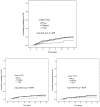Long-Term Hydroxychloroquine Therapy and Risk of Coronary Artery Disease in Patients with Systemic Lupus Erythematosus
- PMID: 31195632
- PMCID: PMC6616930
- DOI: 10.3390/jcm8060796
Long-Term Hydroxychloroquine Therapy and Risk of Coronary Artery Disease in Patients with Systemic Lupus Erythematosus
Abstract
Systemic lupus erythematosus (SLE) is a chronic systemic inflammatory disease associated with a high prevalence of cardiovascular disease (CVD). Hydroxychloroquine (HCQ) is commonly used to control disease activity in patients with SLE. We evaluated its potential additional therapeutic effect for reducing CVD in SLE patients. We conducted a retrospective cohort study, in which one million participants were sampled from 23 million beneficiaries and data were collected from 2000 to 2013. In total, 826 SLE patients receiving HCQ medication were included after exclusion for previous CVD. The total number of SLE patients was 795 after follow-up for more than one year. After adjusting for chronic comorbidity, a significantly decreased hazard ratio (HR) for coronary artery disease (CAD) was found among SLE patients with a high usage of HCQ for at least 318 days (HR = 0.31, 95% confidence interval, CI: 0.12-0.76). A low HR for CAD was observed in SLE patients with a high cumulative dose of at least 100,267 mg HCQ (HR = 0.25, 95% CI: 0.09-0.66). However, there was no significant lowering of the HR for stroke. Long-term HCQ therapy decreases the HR of CVD in SLE patients. The cardiovascular protective effect of HCQ therapy was associated with decrease in CAD, but not stroke.
Keywords: Hydroxychloroquine; atherosclerosis; cardiovascular disease; inflammation; lupus; stroke.
Conflict of interest statement
The authors declare no conflict of interest.
Figures


Similar articles
-
Cardiovascular Protection of Hydroxychloroquine in Patients with Sjögren's Syndrome.J Clin Med. 2020 Oct 28;9(11):3469. doi: 10.3390/jcm9113469. J Clin Med. 2020. PMID: 33126508 Free PMC article.
-
Longterm Hydroxychloroquine Therapy and Low-dose Aspirin May Have an Additive Effectiveness in the Primary Prevention of Cardiovascular Events in Patients with Systemic Lupus Erythematosus.J Rheumatol. 2017 Jul;44(7):1032-1038. doi: 10.3899/jrheum.161351. Epub 2017 May 15. J Rheumatol. 2017. PMID: 28507183
-
Hydroxychloroquine reduces risk of incident diabetes mellitus in lupus patients in a dose-dependent manner: a population-based cohort study.Rheumatology (Oxford). 2015 Jul;54(7):1244-9. doi: 10.1093/rheumatology/keu451. Epub 2015 Jan 12. Rheumatology (Oxford). 2015. PMID: 25587177
-
Hydroxychloroquine in systemic lupus erythematosus: overview of current knowledge.Ther Adv Musculoskelet Dis. 2022 Feb 14;14:1759720X211073001. doi: 10.1177/1759720X211073001. eCollection 2022. Ther Adv Musculoskelet Dis. 2022. PMID: 35186126 Free PMC article. Review.
-
Hydroxychloroquine in systemic lupus erythematosus (SLE).Expert Opin Drug Saf. 2017 Mar;16(3):411-419. doi: 10.1080/14740338.2017.1269168. Epub 2016 Dec 14. Expert Opin Drug Saf. 2017. PMID: 27927040 Review.
Cited by
-
Biomarkers in Systemic Lupus Erythematosus along with Metabolic Syndrome.J Clin Med. 2024 Mar 29;13(7):1988. doi: 10.3390/jcm13071988. J Clin Med. 2024. PMID: 38610754 Free PMC article. Review.
-
Systemic lupus erythematosus and atherosclerosis: immune pathways and the uncharted territory of gut microbiota and metabolism.Front Immunol. 2025 Apr 28;16:1492726. doi: 10.3389/fimmu.2025.1492726. eCollection 2025. Front Immunol. 2025. PMID: 40356907 Free PMC article. Review.
-
Hydroxychloroquine is protective to the heart, not harmful: a systematic review.New Microbes New Infect. 2020 Sep;37:100747. doi: 10.1016/j.nmni.2020.100747. Epub 2020 Aug 20. New Microbes New Infect. 2020. PMID: 32839670 Free PMC article. Review.
-
Inflammation and autoimmunity in atherosclerosis.Reumatologia. 2022;60(1):1-3. doi: 10.5114/reum.2022.113364. Epub 2022 Feb 28. Reumatologia. 2022. PMID: 35645416 Free PMC article. No abstract available.
-
COVID-19, hydroxychloroquine and sudden cardiac death: implications for clinical practice in patients with rheumatic diseases.Rheumatol Int. 2021 Feb;41(2):257-273. doi: 10.1007/s00296-020-04759-2. Epub 2021 Jan 1. Rheumatol Int. 2021. PMID: 33386447 Free PMC article. Review.
References
LinkOut - more resources
Full Text Sources
Miscellaneous

